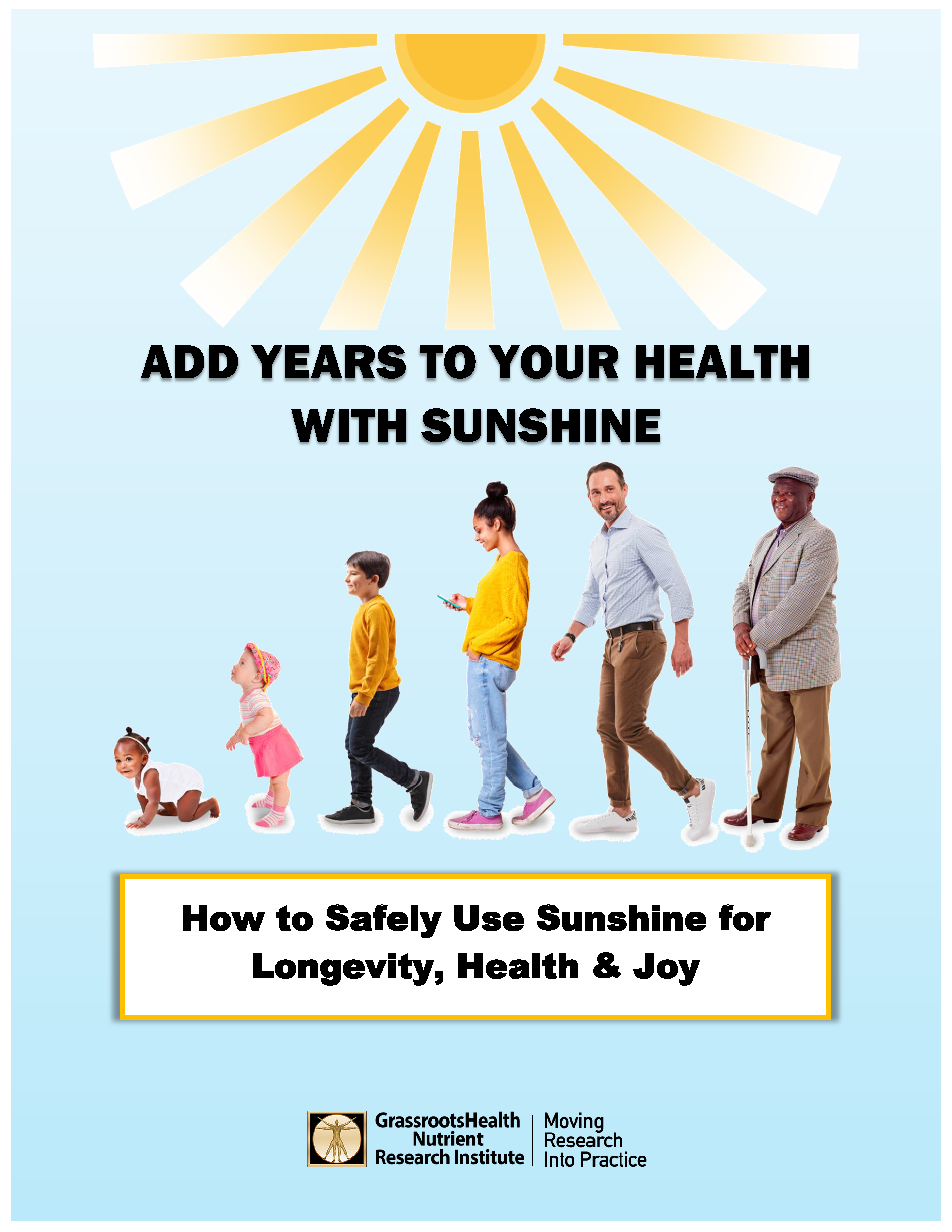May is Sunshine Month!
Get the Sunshine eBook FREE with any purchase, donation or newsletter sign-up during the month of May
Learn the truth about the many benefits of sunshine for our health and how to incorporate sun exposure safely based on individual factors

With our NEW sunshine eBook, you will learn:
- the health benefits of sunshine
- what happens in our bodies when exposed to sunshine
- how and when to make vitamin D from sun exposure and how this is different from taking a supplement
- how to utilize sensible sun exposure to minimize the risks of sun exposure and maximize the benefits for skin and overall health
- and more…
Donate to Help Fight Sunshine Misinformation

My Gift
Get your Sunshine eBook FREE with the purchase of a home test kit for vitamin D and other health measures this month, and get 10% off your purchase with the code SUNMONTH23.
Use the eBook to Help Fight Sunshine Misinformation!
New information has been available and published pushing for updated sun exposure guidelines for several years — but what is the chance that you heard anything about it?

Were you aware that
- in 2016, a meeting sponsored by the US National Cancer Institute called for updated sun exposure guidelines based on individual risk factors, highlighting the beneficial effects of sun exposure, including vitamin D production and nitric oxide release, stating “Reducing risk for one disease should not come at the cost of increasing risk for another.”
- in February, 2022, the World Health Organization hosted a webinar, “Striking a balance: harms and benefits of sun exposure,” which discussed the benefits of sunshine exposure, most notably the production of vitamin D, with an emphasis on how the balance of benefits and harms differs by skin type.
- in March 2023, Australia became the first country to provide updated guidelines for sun exposure based on skin type, risk of skin cancer, and risk of vitamin D deficiency, officially recommending increased sun exposure for darker skinned people. The recommendations are endorsed by the Cancer Council Australia, Skin Cancer College Australasia, Australasian College of Dermatologists, Healthy Bones Australia, The Australian and New Zealand Bone and Mineral Society, Melanoma Patients Australia, and MS Australia.
Harness the power of sunshine for your health by learning how to balance the risks and benefits of sun exposure based on your individual risk factors. Get your eBook today with your Donation or Purchase (save 10% with code SUNMONTH23)!
Quotes from Geller et al., JAMA Dermatology (2018)
“A shift toward nuanced messaging, or “precision targeting,” has considerable potential.”
– HINT: this precision targeting includes measuring your vitamin D level!
“Sun protection strategies must reflect the understanding that human skin pigmentation evolved to balance the negative and positive effects of sun exposure…”
“New data from research in skin biology, cancer epidemiology, physiology, and skin pigmentation genetics are leading to a more nuanced understanding of the reactions of human skin to UVR. This information is making it possible to develop sun safety programs that emphasize assessment of individual risk based on ancestry, age, location, and lifestyle.”
“…although the harms associated with overexposure outweigh the benefits, the beneficial effects of UVR exposure should not be ignored in developing new sun safety guidelines.”
Vitamin D Status Can be an Indicator of Having Received Sufficient Sun Exposure
According to Australia’s new position statement
“Avoiding the sun and using dietary sources and/or vitamin D supplements to meet vitamin D requirements may seem an attractive solution. However, exposure to UV radiation may have benefits independently of vitamin D, particularly for the immune system, with adequate vitamin D status being an indicator of having received sufficient sun exposure to obtain other benefits. Further, exposing the eyes to longer wavelengths in sunlight reduces the risk of myopia, influences circadian rhythm, and improves sleep and mood. Aside from the direct benefits of sunlight, spending time outdoors facilitates physical activity, which plays a vital role in maintaining health and well-being. Thus completely avoiding sun exposure is not optimal for health.”
The body is designed to produce vitamin D in the skin upon exposure to UVB radiation from sunshine. The vitamin D level is therefore often used as a measurement for adequate sun exposure, and especially for those who don’t supplement with vitamin D, a vitamin D deficiency can also indicate “sunshine deficiency.”
Save 10% with code SUNMONTH23, and keep in mind that there are many benefits to sunshine exposure beyond vitamin D – go out and get some sun!
